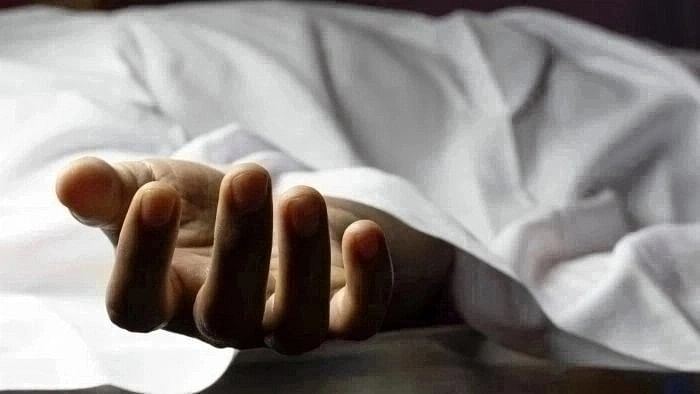
Representative image showing a dead body.
Credit: iStock Photo
Mexico City: At least six migrants were killed in southern Mexico on Tuesday night after military officers shot at the vehicle they were traveling in. The episode called attention to a growing concern in Mexico -- ever more powerful armed forces that operate with little oversight -- and a continuing one, the dangers faced by migrants in the country.
Mexico's defense ministry said in a statement Wednesday that the officers were doing "ground reconnaissance" in the state of Chiapas when they spotted a pickup truck traveling fast, and that the truck's driver tried to evade the soldiers. Behind the pickup truck were two vehicles that the military said were similar to those organized crime groups in the region use: stakebed trucks, small flatbeds with fencing in the cargo area.
The officers may have mistaken the migrants for cartel members, according to the ministry defense ministry.
The military said the officers "heard explosions," so two of them opened fire, bringing one of the trucks to a stop. It was carrying a group of 33 migrants from around the world. Four people died at the scene and two at a hospital, officials said. Ten others were injured. The rest were handed over to Mexican immigration officials.
The military did not say whether the migrants were armed.
Authorities did not immediately release the identities of the victims. A collective of migrant rights groups said in a statement that among the dead were four men, a woman and a girl. The targeted migrants, the statement added, came from Nepal, India, Egypt, Saudi Arabia, Pakistan and Cuba.
"These facts are neither accidental nor isolated," the collective said. "They are a direct consequence of ordering military deployment to contain migratory flows under a logic of persecution and not of protection."
The route through Chiapas, which borders Guatemala and has seen a rise in violence because of clashes between criminal groups, is popular with U.S.-bound migrants. Between January and July, Mexican authorities detained 285,157 migrants in the state -- trailing only neighboring Tabasco for the most in the country. Increasingly, migrants from Asia and Africa have been traveling to Central and South America to make their way north.
Stephanie Brewer, the Mexico director at the Washington Office on Latin America, a research and advocacy organization, said that with the U.S. asylum system overwhelmed, migrants find other ways, such as paying smugglers or criminal groups to move them, and face extortion, violence, kidnapping and other dangers along the way.
She said these patterns have "become aggravated in recent years, in large part because of U.S. border policies that bottleneck and trap migrants in Mexico and make them more vulnerable to violence while they're here."
The killings in Chiapas took place hours after Mexico's first female president, Claudia Sheinbaum, took office.
During a speech in a packed plaza in Mexico City, Sheinbaum rejected critics who point to increased militarization in Mexico -- a move that her mentor and predecessor, Andrés Manuel López Obrador, pushed for during his administration.
"In our country, there is no state of emergency, there are no human rights violations," Sheinbaum told a crowd of supporters. "What we have is more democracy, more freedoms and rule of law."
But during the López Obrador administration, the military was involved in multiple extrajudicial killings, human rights groups have documented. In February 2023, for example, a group of seven friends, including an American citizen from San Antonio, were chased and shot by Mexican soldiers in the border city of Nuevo Laredo. Five of the men were killed.
"What I see is a total dissonance between the triumphalist discourse in terms of security and human rights and the atrocious, brutal reality," said Jacques Coste, a historian specializing in human rights and militarization. "What's going to continue to happen during this term is that events like this are going to be minimized."
The armed forces, already in charge of public security as well as managing the country's ports, airports and customs, and operating a portfolio of infrastructure projects, gained another responsibility last week. Lawmakers approved a constitutional amendment, sent by López Obrador as part of a series of proposals to change the constitution, to put the 130,000-strong national guard under the military's control.
The move raised concerns among experts about a potential rise in arbitrary abuses that could be difficult, even impossible, to investigate, given the armed forces's opacity.
In the latest shooting in Chiapas, the defense ministry said that the two soldiers who opened fire on the migrants were removed from their duties, and that both the military and Mexico's Attorney General's Office would look into the case.
"Usually, when there are confrontations, the statement is always the same: They saw a suspicious vehicle, they repelled the attack and they present the death toll. And that's it. There is no investigation," said Catalina Pérez Correa, an expert on the military at the Supreme Court's Center for Constitutional Studies.
"Until there are independent investigations by authorities other than the defense ministry itself," Pérez Correa said, "we are not going to know what happened, and there will be no accountability."